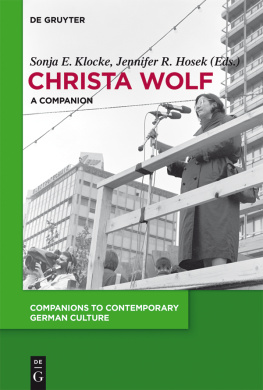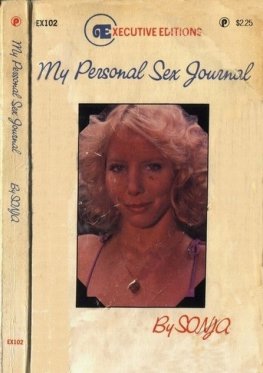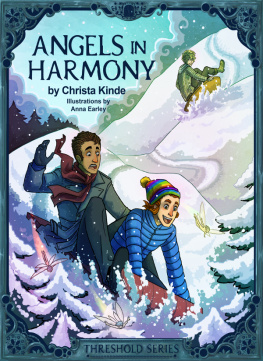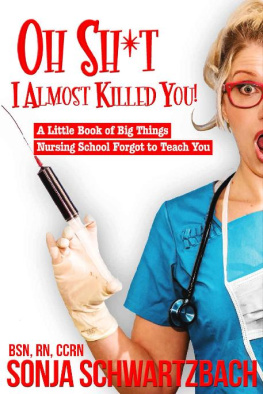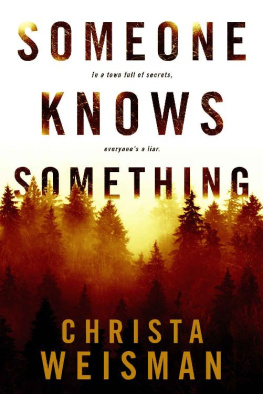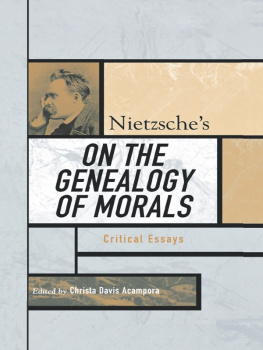Klocke Sonja E - Christa Wolf
Here you can read online Klocke Sonja E - Christa Wolf full text of the book (entire story) in english for free. Download pdf and epub, get meaning, cover and reviews about this ebook. year: 2018, publisher: De Gruyter, genre: Art. Description of the work, (preface) as well as reviews are available. Best literature library LitArk.com created for fans of good reading and offers a wide selection of genres:
Romance novel
Science fiction
Adventure
Detective
Science
History
Home and family
Prose
Art
Politics
Computer
Non-fiction
Religion
Business
Children
Humor
Choose a favorite category and find really read worthwhile books. Enjoy immersion in the world of imagination, feel the emotions of the characters or learn something new for yourself, make an fascinating discovery.
- Book:Christa Wolf
- Author:
- Publisher:De Gruyter
- Genre:
- Year:2018
- Rating:3 / 5
- Favourites:Add to favourites
- Your mark:
- 60
- 1
- 2
- 3
- 4
- 5
Christa Wolf: summary, description and annotation
We offer to read an annotation, description, summary or preface (depends on what the author of the book "Christa Wolf" wrote himself). If you haven't found the necessary information about the book — write in the comments, we will try to find it.
Christa Wolf — read online for free the complete book (whole text) full work
Below is the text of the book, divided by pages. System saving the place of the last page read, allows you to conveniently read the book "Christa Wolf" online for free, without having to search again every time where you left off. Put a bookmark, and you can go to the page where you finished reading at any time.
Font size:
Interval:
Bookmark:

Sonja E. Klocke, Jennifer R. Hosek (Ed.)
Christa Wolf
Companions to Contemporary German Culture

Edited by
Michael Eskin Karen Leeder Christopher Young
Volume 8
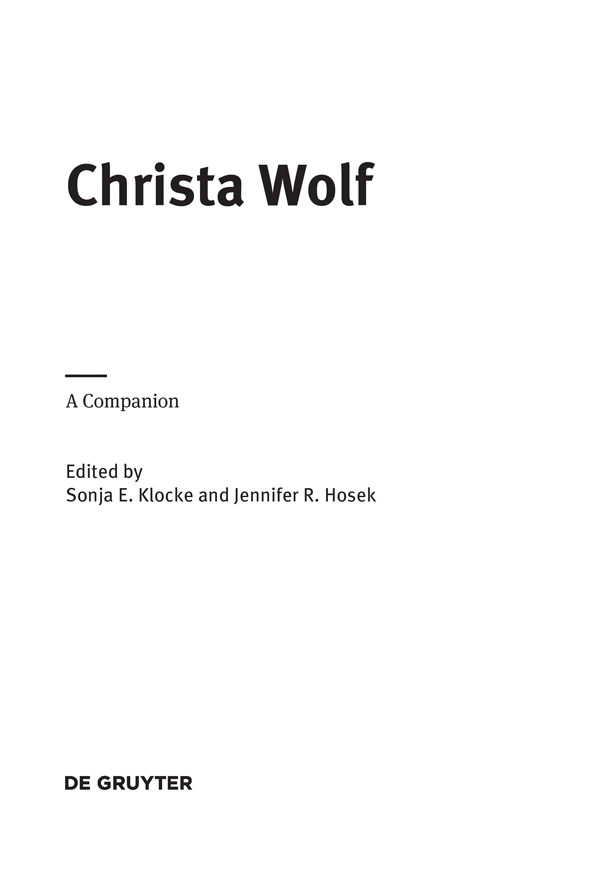
ISBN 978-3-11-049199-9
e-ISBN (PDF) 978-3-11-049600-0
e-ISBN (EPUB) 978-3-11-049345-0
ISSN 2193-9659
Library of Congress Cataloging-in-Publication Data
A CIP catalog record for this book has been applied for at the Library of Congress.
Bibliographic information published by the Deutsche Nationalbibliothek
The Deutsche Nationalbibliothek lists this publication in the Deutsche Nationalbibliografie; detailed bibliographic data are available on the Internet at http://dnb.dnb.de.
2018 Walter de Gruyter GmbH, Berlin/Boston
Cover image: Christa Wolf. Demonstration on the Alexanderplatz, Berlin on 4 November 1989.
akg-images / ddrbildarchiv.de / Manfred Uhlenhut
www.degruyter.com
Quotations from Christa Wolfs work are given in German and English. In general, contributors quotes in English refer to official English translations provided in the bibliography, unless no official translation existed, or if they needed to work with their own translation to make a particular linguistic or formal point. Each contributor acknowledges the translations used in their endnotes or highlights their own translations. All translations, whether official or undertaken by the contributors, follow the relevant German quotation in square brackets. The primary aim is to provide an accessible working translation.
To avoid unnecessary repetition, however, the titles of Christa Wolfs main works are given in German only. The titles of individual essays and poems are given both in German and in English throughout. For ease of reference, a list of translations of these main works is included here, and a more detailed Select Bibliography is given at the end of the volume.
Moskauer Novelle (1961)
[Moscow Novella]
Der geteilte Himmel (1963)
[ The Divided Heaven (1965)]
Juninachmittag (1967)
[June Afternoon in What Remains and other Stories (1993)]
Nachdenken ber Christa T . (1968)
[The Quest for Christa T. (1970)]
Neue Lebensansichten eines Katers (1973)
[The New Life and Opinions of a Tomcat in What Remains and Other Stories (1993)]
Kindheitsmuster (1976)
[ A Model Childhood ; Patterns of Childhood (1980)]
Kein Ort. Nirgends (1979)
[ No Place On Earth (1982)]
Kassandra. Vier Vorlesungen Eine Erzhlung (1983)
[ Cassandra. A Novel and Four Essays (1984)]
Strfall. Nachrichten eines Tages (1987)
[ Accident. A Day s News (1989)]
Sommerstck (1989)
[Summer Play]
Was bleibt. Erzhlung (1990)
[What Remains in What Remains and other Stories (1993)]
Medea. Stimmen (1996)
[ Medea. A Modern Retelling (1998)]
Leibhaftig (2002)
[ In the Flesh (2005)]
Ein Tag im Jahr. 1960 2000 (2003)
[ One Day a Year. 1960 2000 (2007)]
Stadt der Engel oder The Overcoat of Dr. Freud (2010)
[ City of Angels. Or, The Overcoat of Dr. Freud (2013)]
August (2012)
[ August (2014)]
Ein Tag im Jahr im neuen Jahrhundert (2013)
[ 27 September. One Day a Year (2017)]
Sonja E. Klocke and Jennifer R. Hosek
Following a period of relative silence, Christa Wolf (19292011) was recognized for her oeuvre with several major prizes just before she passed away. Among these were the prestigious Thomas-Mann-Preis and the Uwe-Johnson-Preis (both 2010), as well as the Hrkules (2011) for her last novel, Stadt der Engel (2010) an audience award that speaks particularly to the ongoing and even revived interest of a large Wolf fan base. This influential figure was and is celebrated not only nationally, but also internationally. The author of world-famous prose texts such as Nachdenken ber Christa T . (1968), Kindheitsmuster (1976), Kein Ort. Nirgends (1979), Kassandra (1983) and Medea. Stimmen (1996) all available in English translation is considered by many to have been the pan-German writer. She not only occupied a central position in the literature of the GDR [the German Democratic Republic; East Germany], but also in public life and, until 1965, in GDR politics.
In order to appreciate Wolfs significance for the literature and culture of the socialist state, as well as for GDR citizens who had to deal with everyday life under socialism, it is vital to understand the political, social and cultural contexts in which her writings developed from the implications of World War II and the Nazi regime to the meanings of the fall of the Wall in 1989 and German unification just a year later. To this end, this introduction provides an overview of the most relevant political occurrences in the GDR as they pertain to developments in cultural production, sketches the shape and influence of the GDRs culture industry, including the East German film agency, the DEFA, and highlights the relationships of artists and particularly Wolfs relationship to the socialist state. It traces Wolfs unique role in the socialist East and in post-unification Germany, particularly also in the so-called literary debate of the early 1990s, which ensnared her and proved significant for her reception post-1989. This introduction sets the stage for the investigations of this volume regarding the current and continuing relevance of Wolfs oeuvre within and outside of Germany, and within the context of world literature.
Born in Landsberg/Warthe, what is today Gorzw Wielkopolski in Poland, on 18 March 1929, Christa Wolf left her hometown as a teenager, during the last days of World War II, for Mecklenburg-Vorpommern, a northeastern German state. Her efforts to be useful in society she initially worked as a typist for the mayor of Gammelin and returned to school in Schwerin in 1946 were impeded by a serious illness, for which she was admitted to a sanatorium for consumptives. It seems that in 1946, she developed a pattern that would shape her entire life: she would retreat into illness as a means of protection against psychological and physical strain. Aware of this paradigm, the author later employs it in her writing, in which most of her protagonists from Rita in Der geteilte Himmel (1963) to the nameless narrator-protagonist in Stadt der Engel oder The Overcoat of Dr. Freud (2010) react physically to stressful situations, particularly when these are brought about by political events. Despite these physical challenges, Wolf graduated in 1949 from Gymnasium [high school] in Bad Frankenhausen am Kyffhuser with an Abitur [the diploma necessary for university admission] and joined the SED [Sozialistische Einheitspartei Deutschlands; the Socialist Unity Party]. In the same year, she took up the study of German literature in Jena and Leipzig, finishing her degree in 1953.
How can we explain the early and rather swift decision of this former member of the Nazi youth organization BdM [Bund deutscher Mdel; the League of German Girls] in Hitlers Germany to join the socialist party in the GDR? Having For instance, continuities in the staffing of leadership roles in government, the judiciary and business in the FRG influenced the GDR in declaring the capitalist West the exclusive successor of National Socialism, while they positioned themselves as the legitimate heir to the anti-fascist resistance to Nazi rule. In other words, the SED legitimated its claims to power through the discourse of anti-fascism.
Font size:
Interval:
Bookmark:
Similar books «Christa Wolf»
Look at similar books to Christa Wolf. We have selected literature similar in name and meaning in the hope of providing readers with more options to find new, interesting, not yet read works.
Discussion, reviews of the book Christa Wolf and just readers' own opinions. Leave your comments, write what you think about the work, its meaning or the main characters. Specify what exactly you liked and what you didn't like, and why you think so.

